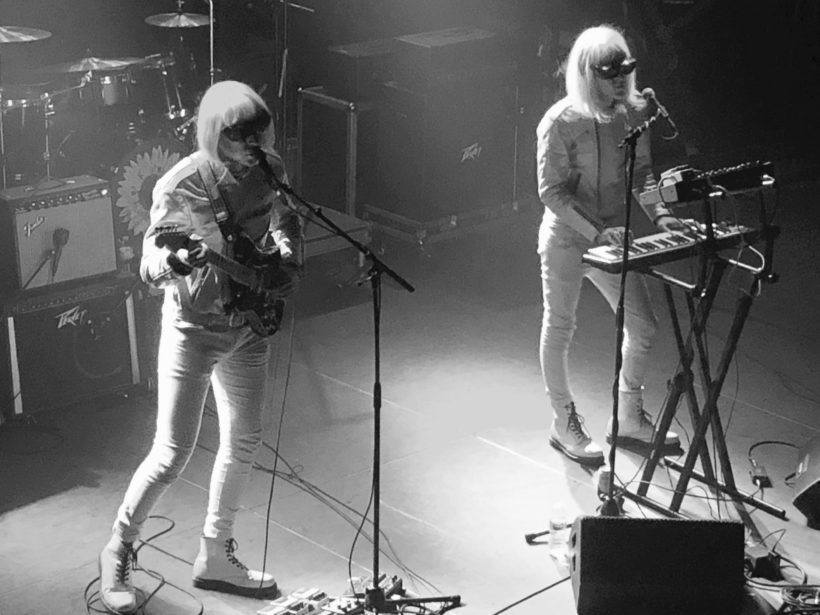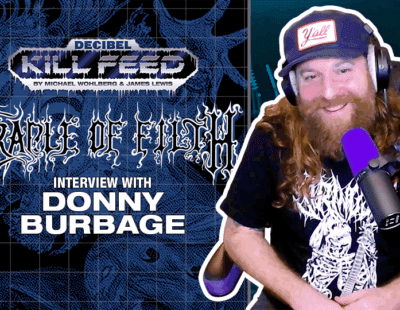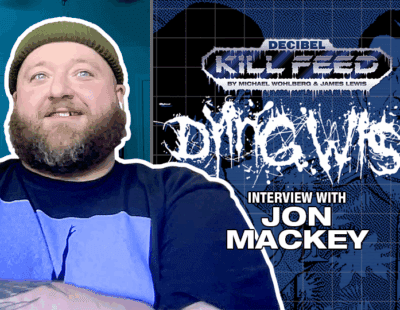
Drab Majesty don’t fit neatly into any prescribed genre. The Los Angeles-based duo of Deb Demure (aka Andrew Clinco) and Mona D (Alex Nicolaou) have been labeled darkwave, post-punk, dream pop, gothic, and cold wave. Truth is, Drab Majesty embody aspects of the aforementioned genres but aren’t beholden to any of them. The dreamy, hypnotic, gossamery merge of fingerpicked guitar, old-school keyboard sounds, sampled drums, and reverbed/chorused vocals create the perfect backdrop for Drab Majesty’s music.
Expanded upon and made more complex over two full-lengths — 2015’s Careless and 2017’s The Demonstration — Drab Majesty’s music is, however, consistently engaging. It strikes deep into the heart of the listener, evoking times past, times that never were, and universally relatable themes. There’s a vulnerability to Drab Majesty. Songs like “The Foyer,” “Unknown to the I,” “The Heiress,” “39 By Design,” “Dot in the Sky,” and “Too Soon to Tell” expertly run through Drab Majesty’s wide palette. They feel like things we’ve heard before but haven’t. They sound like things we’ve felt before but haven’t.
Decibel sat down with Deb Demure and Mona D to learn more about Drab Majesty’s mysterious background, its striking videos, the group’s non-gender specific imagery, and its fascination with religious cults. We also found out a new album, the follow-up to The Demonstration, is on the horizon…
Did you expect Drab Majesty to appeal to a wider audience (other than yourself) when you first set out?
Deb DeMure: I never did. I just wanted to make music that I enjoyed. I never cared for the wider reach. But it’s really hard to calculate that in any band unless you’re totally making pop songs that are pandering to a certain audience. So, it’s surprising to see how many people have come to enjoy Drab Majesty. I mean, we’re talking to a magazine that has a predominant history in metal. That’s been the most surprising, the strong support from the metal community, a place I never really imagined Drab situating itself in. I think it’s cool.
I hadn’t heard Drab Majesty prior to your most recent album, The Demonstration. I heard “Dot in the Sky” on YouTube and immediately was into it. The song reminded me of the greats from the ’80s, like Joy Division, The Chameleons, Tears for Fears. Was that the sound model when you kicked off Drab Majesty?
Deb DeMure: Well, I started out Drab Majesty after I really got into fingerpicking. I was interested in the arpeggiated guitar styles of the ’80s, the flat-picking. Players like Johnny Marr. But most of all I was into folk at the time. I started off writing folk songs. Then, I picked up an electric, put some chorus on it, and all of a sudden I had turned this one thing — folk — on a particular instrument into another. Maybe it’s even a new genre. I’ve always liked the type of music we’re creating, but it was not a deliberate attempt to be post-punk. The first Drab stuff doesn’t even have drums. It’s just guitar ideas with a fingerpicked guitar. When you add chorus, it becomes very dreamy, psychedelic. That’s how I ended up with the guitar tone or sound that Drab has today.
So, the sound was developed over time?
Deb DeMure: Well, I was into folk songs and folk music structure. If you took a Drab song and put it to acoustic guitar it would sound like a folk song. You’d forget that it was even Drab Majesty. Coming from a folk background, the songs morphed into pop tunes with the new set of instruments. There’s not much deliberation — or there wasn’t much deliberation — into situating Drab Majesty into a specific genre. We listen to and like a lot of different styles of music, all of which (or some of it rather) may end up in Drab Majesty, just changed a lot from its original form. Drab Majesty aren’t genre loyalists.
Mona D: Growing up in Los Angeles, I didn’t really listen to goth or post-punk. When I was in high school, during what I call my brain-forming years, I was into a lot of psychedelia and garage rock. During college, I got really into punk and probing the outer edges of that stuff. So, I’ve never been a genre loyalist or a scene loyalist, but I’m always drawn to obscurities and strange things, filling in gaps in my knowledge. We’re both like that. We’ve both been in bands that played in different music scenes. With Drab, we’ve ridden the wave of surging interest in this kind of music. With the Internet, it’s so easy to discover new music now. Like really obscure 7-inches, stuff that’s never been on CD, vinyl that had really limited pressings, vinyl rips, etc. They expand your knowledge of a genre beyond the people who were even listening to it at the time. Suddenly, you have access to all of it.
Nothing is obscure anymore.
Mona D: It’s all on Discogs. It’s all on the Internet. The Golden Age of music blogging was a total revolution in my taste in music.
That’s basically how I discovered Drab Majesty. A friend posted a link to “Dot in the Sky” on my Facebook feed.
Mona D: The unsung heroes are our time are these anonymous or seemingly anonymous musical curators of things like blogs. They’ll make a post a couple times a week. They build around their blog, this universe in taste in music. I remember a few that were incredible: Phoenix Hairpins, Crispy Nuggets, and Cosmic Hearse. These music blogs changed my life. And I have no relationship with the people who operate the blogs outside of the music they post. That’s the amazing part, really.
I remember discovering the book, A Crack in the Cosmic Egg, in the mid-’90s. Krautrock suddenly became far deeper and wider than I had ever imagined. I thought it ended with Can, Tangerine Dream, Amon Düül, Amon Düül II. Then, here’s Eloy, Dzyan, Popol Vuh, Cluster, Ash Ra Tempel, and so many more. It was an explosion of possibilities I had never thought possible.
Mona D: I have that book. It’s amazing. Remember, that book and others like it are acts of creating a historical narrative that didn’t exist at the time. There was nothing united under the banner, ‘Krautrock.’ It was a culture that was recovering from a war. Suddenly, the older generation is wrong. The rebellion and the fallout from that period created a playfulness and inventiveness in music. What do you do when the conventions of your parents and your culture are laid to waste or are now irrelevant? They forged new paths. They had to. I still think that’s the character of Germany. To bring it all back, we’re looking at it retrospectively as a genre, but it was never really a genre.
To put Drab Majesty into the middle of this do you see parallels to Krautrock? Forging ahead to be different or is it more “this is who we are.”
Deb DeMure: I see it as half and half. Definitely, the theatrics and stage aesthetic was done partly in response to the bland stage performances I had grown bored of. I was paying money to see a glorified band practice. I wasn’t into the affected rock look. We go to shows with our ears and our eyes. There’s so much territory to mine visually. Some of my favorite bands were or are the ones who presented a really unique visual to the audience. Not sure if you’ve heard Master Musicians of Bukkake. They’re an amazing band — a niche band — from Seattle, but it’s Randall Dunn’s (who has produced stuff like Earth) project. When you see a Master Musicians of Bukkake show, you’re changed for life. I watched them repeatedly when we were on tour with them when I was in Marriages. They were opening, which was really weird. But the first time I saw them I wanted to replicate that ritual or magical vibe on stage.
Mona D: It’s also hard in this day and age to receive the kind of audience that might be inclined to mythologize a band, but I guess you can kind of do it yourself if you approach it with the right sensitivity. Before I joined the band I was immediately drawn to how Deb was able to pull off this very strange aesthetic that somehow fit and meshed with the sound. I was instantly drawn to his character. That adds another layer of complexity to a performance or a band. The questions beg, “Where did this mysterious character come from? Why is it important to the music?” I think that sticks with people. Also, there’s no sillier character than the jaded-cool band guy on stage. A lot of people play that character. That’s not very compelling. I know a lot of musicians that are really cool people, but to watch them posture on stage is always odd. I’d rather not be myself. That’s far more fun.
Visually and aesthetically, my interaction with Drab Majesty is online only. Photographs, video interviews, which are always interesting, and music video. My social interaction with Drab Majesty is image only. I half expected the two of you to be dressed as Greco-Roman statues.
Deb DeMure: That’s a fair assessment. A lot people think when we’re off stage we’re this thing. They don’t want the mythology to break. Other people get it. They know were just people. The stage costume is a ceremonial garb. We’ve realized over time that the stage costume needs to stay on stage and when we’re off, we’re back to regular people. There’s a rift when you’re off stage but in garb yet out of character. That’s way more detrimental to the mythology than to just see us normally. The interstice between both worlds shouldn’t exist. It’s like seeing Barney having a cigarette outside. [Laughs]
Mona D: You don’t want to see the priest at the brothel.

But there’s a lot disparate imagery coming together, right? The Greco-Roman statue theme, the UFO cult theme, the B-Movie sci-fi theme, and the non-gender specific look. In what universe, do all these things exist at the same point?
Deb DeMure: I’ve always had an interest in stoicism. The Greco-Roman statue thing has multiple facets. I come from a fine art background. I went to school for sculpture. But going to Hearst Castle as a kid got me into this space, of appreciating sculpture and Greco-Roman sculpture. Going there as a kid I thought they were people frozen in time. That their souls were inside. I didn’t understand they were reproductions. The aura of these art objects having a soul was pretty profound to me. The same with the buildings and structures. When you see these sculptures up close you can see the reverberations or trace of the artist’s hand. That’s what I was picking up as a kid, but thinking there was a person inside of it. There’s a record of human touch, of consciousness. My grandmother had a Rodin sculpture. It was given to her as a gift. It was Pope bust. It was this black iron Pope bust. It always tripped me out as a kid. So, that’s also part of my interest in statuesque imagery. As for UFO cults, I appreciate them. I want to make a nod to them. They’re precious and beautiful. But really I want to shine a light on all of it.
There’s no commentary or judgment on things like the UFO cults, the statues, or the imagery you’ve come up with?
Deb DeMure: Absolutely not. There’s no judgment here. People have judged me for using the image of a Geisha, which has been a tricky one to navigate. But it’s always out of reverence and respect. Here’s this figure in Japanese culture, who’s an entrepreneur, a multi-disciplinary artist. These are things I revere and hold in high regard. I don’t want to explain symbolism too much. It’s more interesting to offer these signifiers to see how they resonate.
Your persona, as Deb, is one such symbol. How have people reacted to your choice in gender, which appears to be female.
Deb DeMure: For me, it’s not female. It’s no human. No human trace. That’s why we white our faces out. We wear sunglasses. There’s no connection to eyes. For me, it’s about losing identity entirely, not necessarily gender identity. I understand why people think that, however.
Mona D: The name sounds feminine, but it’s not. There’s an explanation behind the name, Deb. Actually, there’s an explanation for both of us.
Deb DeMure: The logo I want to talk about. I don’t think it’s ever been received the right way. The logo is the gender-less vessel. Here are the eyes, the face is covered with the fan. The only role the fan has is to obscure the face. The eyes are the window to the soul. So, it’s just eyes. There is no gender. Eyes without a face… [Laughs] Oh, man, that was terrible.
The Demonstration has been out for over a year now. Are you working on new material?
Deb DeMure: We’re halfway through the new record. It’s moving slow. We hope to have it turned in by October 1st.
** Drab Majesty’s The Demonstration is out now on Dais Records. It’s available on LP — from black to glow in the dark — and CD by clicking HERE.






